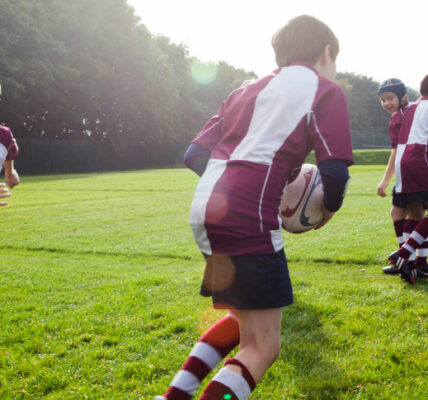There’s something about playing for your hometown that makes the jersey cling tighter. Not physically, though sweat does that too, but emotionally. Psychologically. The threads feel stitched with more than cotton: there’s memory in there, legacy, expectation. Because when the crowd in the stands includes your neighbours, your ex, your teacher, your cousin, and that guy who sold you airtime in matric, it’s not just a game anymore. It’s a reckoning.
In towns across KwaZulu-Natal, from Kokstad to KwaMashu, rugby fields aren’t neutral. They’re sacred and loaded. They remember. They hold grudges. They whisper stories of players who almost made it, who fumbled, who flew, who vanished. The lines on the pitch are redrawn each year, but the pressure never fades. It just finds new shoulders to sit on.
Ask a young lock from Newcastle what it’s like running out in front of the same crowd that saw him drop the ball in grade 8. Ask a fly-half from Mtunzini how it feels to play against his former school, wearing the colours of his new club. Ask anyone who’s heard the cheer turn into a cough when they miss a kick. Playing away comes with its own challenges. But it’s anonymous in a way that home never is. Away, the boos bounce off. At home, they stick. They sound like someone you know.
Because home crowds remember. They remember when you were short and chubby and tripped over the cones at practice. They remember your mom yelling at the coach. They remember the try you scored in U13B and how they told the whole street. And now, they expect. They demand. They want you to win, not for points, but for pride. For the street. For the surname. For the story they’ll tell on Monday. “You know he’s from here, right?” they say. As if that explains everything. As if failure is somehow treason. As if you don’t already feel it in your chest.
 One mistake, and it’s not just your coach’s voice in your ear. It’s the entire community. Your auntie who skipped a shift to come watch. The gogo who packed sandwiches for the whole bench. The taxi driver who gave you a free lift, telling you not to choke. There’s glory in playing for home. But there’s no place to hide. And the strangest part? The love and the pressure are the same thing. They cheer louder because they care more. They push you harder because you’re one of them. If you were from somewhere else, they might not even notice you. But you’re not. You’re theirs. Some thrive in it. Some crumble. Most float somewhere in between, brilliant one day, burdened the next.
One mistake, and it’s not just your coach’s voice in your ear. It’s the entire community. Your auntie who skipped a shift to come watch. The gogo who packed sandwiches for the whole bench. The taxi driver who gave you a free lift, telling you not to choke. There’s glory in playing for home. But there’s no place to hide. And the strangest part? The love and the pressure are the same thing. They cheer louder because they care more. They push you harder because you’re one of them. If you were from somewhere else, they might not even notice you. But you’re not. You’re theirs. Some thrive in it. Some crumble. Most float somewhere in between, brilliant one day, burdened the next.
There’s a boy in Port Shepstone who taped his father’s name to the inside of his jersey. Every tackle he made was a message. Every try he scored was a conversation he never got to finish. There’s a girl in Howick who kicks with the same ritual every time: three steps, tap her shin, look to the trees. She says it calms her down, reminds her where she is. Reminds her why.
The jersey is heavier at home because it’s layered. It’s stitched with every voice that’s ever told you “you’re good, but…” and every smile that beamed when you laced up your boots. It carries the expectations of your geography. Of that field you first played on. Of that coach who said you’d go far. Of that rivalry that started in primary school and now plays out in adult leagues with stakes that feel both ridiculous and real.
Even the changing rooms feel different when they’re familiar. The bench you always sat on. The crack in the tile. The smell that somehow never changes. It grounds you, but it also haunts you. And then there’s the post-game walk. That stretch from field to fence to car, where congratulations come tangled with critique.
“You played well, man. But that kick…”
“We thought you had them. What happened?”
“I remember when your brother used to play. He was faster.”
It’s not malicious. It’s cultural. It’s part of the rhythm of being known.
Because to play at home is to play for people who see you not just as a number, but as a narrative. You’re not the 8-man. You’re Themba from Road 5, who used to steal mangoes and now sidesteps with the same instinct. You’re Sihle who was quiet in school, but fierce on the field. You’re Nomusa who came back from an injury that no one thought she’d shake. The jersey, at home, is never just fabric. It’s a weight. A banner. A mirror. And maybe that’s why it matters so much.
Because when you win at home, when you lift that ball and they lift their voices, it’s not just you rising. It’s the whole place. The whole memory. The whole messy, complicated love they carry for you, even if they never say it out loud.
So yeah. The jersey is heavier at home. But maybe that’s exactly why we keep wearing it.




